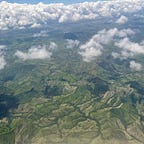Last Few Drops
Most of us have the luxury of getting fresh drinkable water at the turn of a faucet, but that might not be the case after a few years. Some countries like South Africa, India, and others have already started to feel the effects of our reckless water usage. Only 7 out of 10 people have this luxury of getting clean water whenever they want. Out of all the water on our planet, 97% is saltwater, 2% is frozen freshwater so, we all rely on the 1% of liquid freshwater. Even in the 1%, most of it is underground and very expensive to extract, so most of our water sources are from surface water like lakes, rivers, and other water sources. Over the years we have gotten better at retrieving underground water through wells and extracting it from aquifers underground. Aquifers aren’t an unlimited source of water. It takes millennia for aquifers to form and if we drain them, it will take another millennia to form again. With that in mind, we should all be more careful about how we use freshwater.
The below chart explains the high-level water usage across different industries.
This pie chart represents the water usage across different industries.
As the pie chart shows, agriculture consumes the maximum amount of water. It is a big challenge for scientists. As they are trying to figure out ways to grow crops using a minimal amount of water, the growing number of meat-eaters also puts a burden on the water crisis issue. As more and more people in the world are getting influenced by American culture and diet, the world is starting to eat more meat. There isn’t enough water to support that lifestyle for everyone to produce meat it takes more water than anything else.
By keeping these facts in mind we need to make some serious changes in our lifestyle. We can start with some tiny tips that will help us use less water and help the ongoing water crisis.
- If you have a dual sink, and you are washing the dishes, you can fill one side with soapy, warm water for washing, and the other side with cold water for rinsing. If you have one sink, then you can use big bowls instead. This way, you can cut back half the amount of water you would usually use if you kept the faucet running.
- If you have plants at home, instead of watering them inside, plant them outside so that the rain can help them grow instead of watering the plant when it really doesn’t need water when they are inside
- This might be something you have heard a lot, but turn your faucets off completely! The dripping faucets can cause so much extra water to be wasted. Also, if you have a leak in your faucet, then I would recommend that you get that fixed as soon as possible, the same goes for toilets and showers
- When you take a shower, it would really help if you shorten your shower. It saves the amount of water you use and that we can reduce your intake of water at a personal level.
- Water your plants by hand instead of having an irrigation system, you can water your plants when they look like they need water instead of having it constantly being watered.
If you can do these things, I think it will help everyone decrease their intake of water. Last but not least make sure to measure your water bill to ensure progress.
